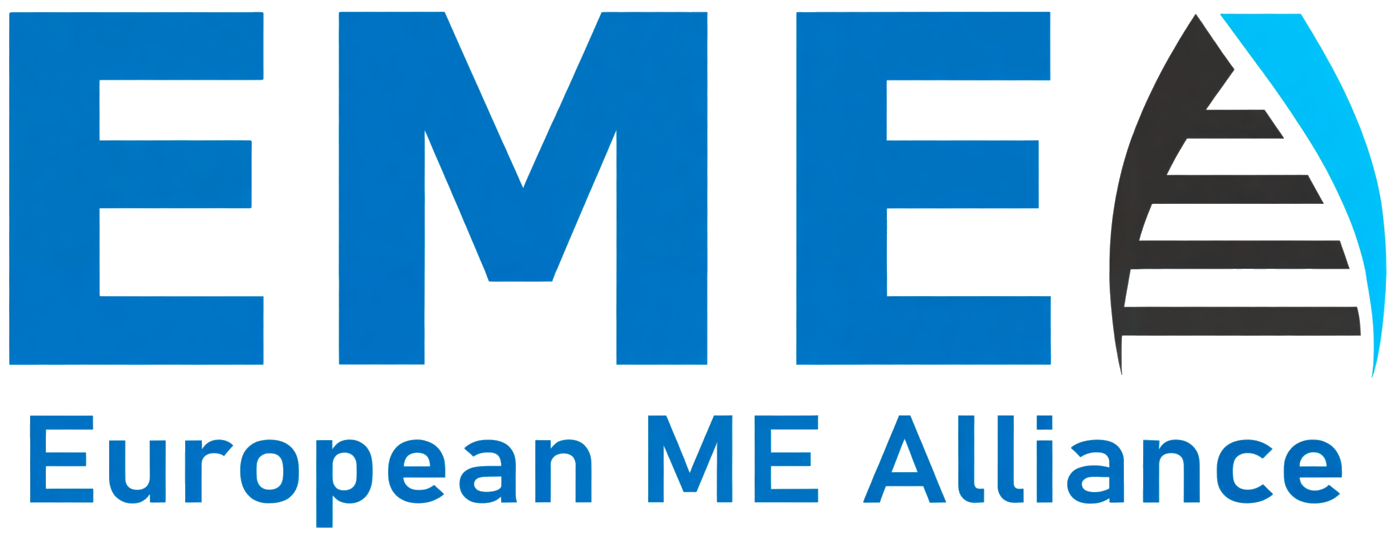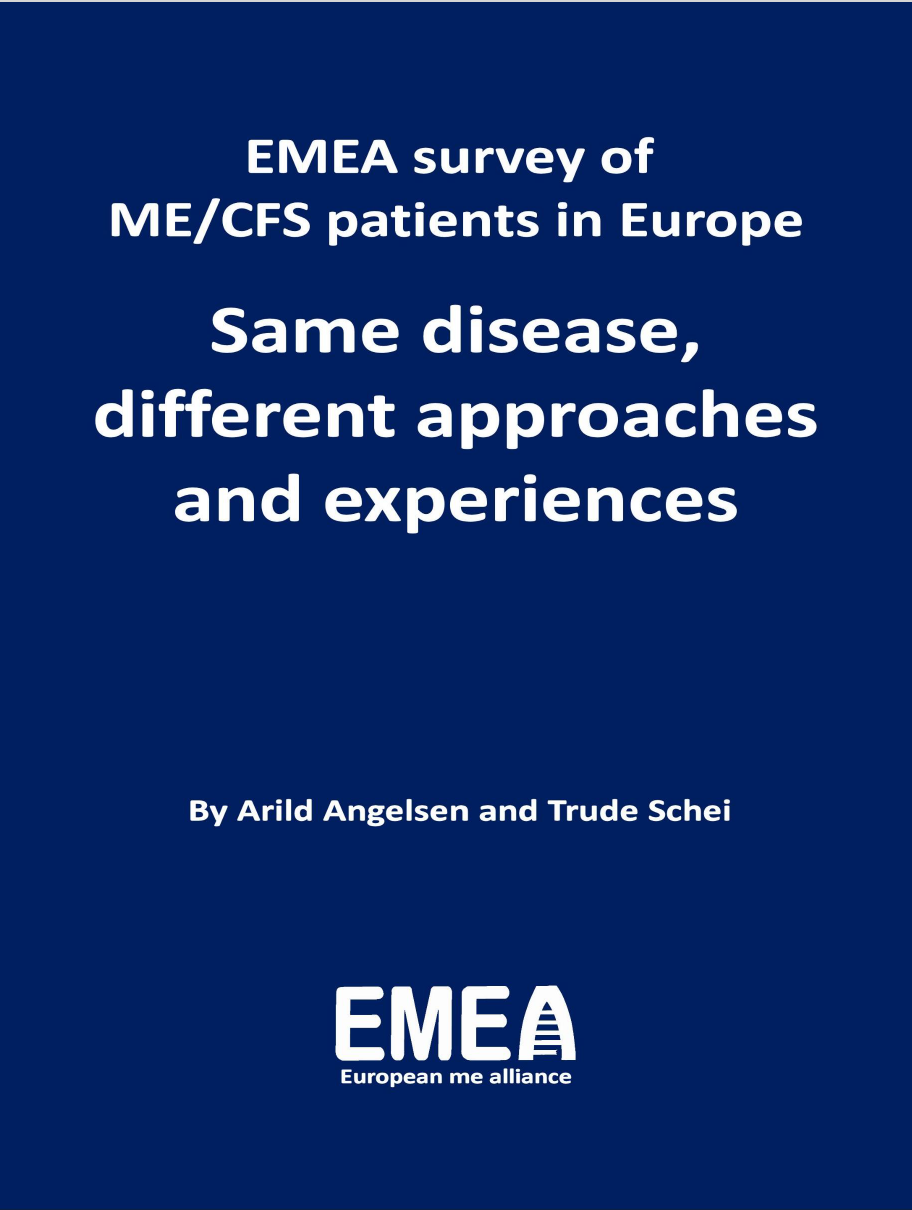Findings from European ME Alliance
Pan-European ME Patient Survey
The long-awaited findings of the European ME Alliance Pan-European ME Patient Survey, initiated in 2021,
have finally been unveiled, painting a distressing picture of neglect and suffering endured
by millions across Europe.
Drawing upon input from over 11,000 individuals, the report
['
EMEA survey of ME/CFS patients in Europe: Same disease, different approaches and experiences']
lays bare the systemic failures and institutional neglect that have perpetuated the suffering for
far too long and
serves to sound the alarm to all stakeholders -
including governments, healthcare providers, research agencies, policy makers, and global organisations -
of the urgent need for concerted action to address the humanitarian crisis facing people with ME and their families.
The report is an indictment of the status quo. Yet, by shining a spotlight on these issues, the report also seeks to catalyse meaningful dialogue and concrete steps towards redressing the injustices faced by ME patients.
The stark revelations underscore the urgent need for concerted action.
Key messages extracted from the report highlight the severity of the disease,
with profound disability levels and unmet needs prevalent among European ME/CFS patients.
Despite mounting evidence, healthcare systems continue to overlook ME/CFS as a serious physical illness,
failing to provide adequate medical care, financial support, and social services.
Incomprehensibly, it is not even recognised in some European countries
despite it being listed under the World Health Organization’s ICD Codes, ICD-10 G93.3 and (later) ICD-11 8E49
as a neurological condition since 1969.
This is a clear failing of EU healthcare provision
and has resulted in the continued violation of patients’ human rights,
especially to the best attainable health, a topic that EMEA is raising with the EU and WHO Europe.
In response to these findings, the European ME Alliance has proposed a series of crucial actions to be undertaken.
Action 1
EMEA urges all European countries to take immediate action in addressing Myalgic Encephalomyelitis and recognise ME/CFS as a somatic illness, as defined by the World Health Organization (WHO). ME/CFS requires standardised diagnosis and treatment protocols. It is imperative that all European governments swiftly adopt and implement WHO International Classification of Diseases (ICD) codes specific to ME/CFS within their healthcare systems.Action 2
EMEA urges a pan-European strategy of coordinated, collaborative biomedical research to be initiated across Europe, by all governments, using established or developing Centres of Excellence for ME.
These centres would be adequately funded and perform translational biomedical research that will look at developing a full understanding of the disease and development of effective treatments to mitigate or cure the disease.Action 3
EMEA urges all European countries to take decisive action in establishing a specialist discipline for ME/CFS by creating academic consultant roles dedicated to ME/CFS and establishing at least one specialist clinical centre aligned with centres of excellence. Recognising the dangerously insufficient awareness and knowledge of ME/CFS, leading to misdiagnosis, missed diagnosis, or very late diagnosis (with an average delay of 6.8 years across Europe), concerted efforts are needed to include the latest scientific evidence on ME/CFS in medical curricula.
Academic consultant roles specialising in ME/CFS would play a pivotal role in this effort, providing expertise and guidance to ensure the integration of ME/CFS education and research into medical curricula while utilising standardised diagnostic and treatment protocols for ME/CFS.Action 4
EMEA urges the EU to initiate a pan-European effort to implement accurate and correct recording of cases of ME/CFS, utilising the most up-to-date diagnostic criteria. This is crucial for understanding the full economic burden of the disease.
As demonstrated in previous EMEA 'ME/CFS in Europe' webinars, EMEA has highlighted the feasibility for all European countries to implement SNOMED CT to record properly occurrences of ME/CFS, facilitating accurate prevalence figures.
EMEA welcomes the opportunity to collaborate with EU institutions, European governments, and other stakeholders, leveraging the achievements of the EMEA pan-European survey, to ensure a thorough evaluation of ME/CFS prevalence and its economic ramifications.
By taking these proactive steps, European governments can demonstrate their commitment to addressing the urgent needs of ME patients and improving their quality of life.
While we recognise that it will take time to deliver and implement these recommendations
their overarching aim is clear: to drive tangible
change and improve the lives of ME patients across Europe.
The urgency of this call to action cannot be overstated and demands immediate attention and intervention.
Failure to act not only perpetuates the suffering of ME/CFS patients and their families
but also undermines the integrity of our European healthcare systems.
As part of its ongoing efforts to raise awareness and advocate for change, EMEA will also be hosting a webinar to delve deeper into the report's findings and explore potential pathways forward. This EMEA webinar will, again, bring stakeholders together, exchange ideas, and propose a course towards a more compassionate and inclusive healthcare system for all.
The release of the report from the EMEA Pan-European ME Patient Survey marks a significant moment in the fight for
recognition and support for ME patients in Europe and should be used
by policy makers to enact change.
It is incumbent upon all stakeholders to heed its findings, heed the call to
action, and work collaboratively towards a future where the needs of ME patients are prioritised and their voices are heard.
The report is available using this link.
Background to the survey
The idea for a pan-European survey among ME-patients originated when a patient survey carried out by Norges ME Forening - later supplemented with a similar survey in Denmark - identified strong similarities in the time of onset of the illness among ME-patients. This then led to a discussion and posed other questions on the similarities and differences across European countries.
EMEA performed the pan-European survey in 2021 and, due to resource limitations with analyses, is now publishing the
finalised report.
We sincerely thank the authors, Arild Angelsen and Trude Schei,
and Norges ME Forening for their support of the survey,
analysis of the results, and production of the survey report.
This survey was the first of its kind comparing the situation and experiences of ME-patients across European countries.
As such, it permits cross-country comparison of a number of aspects,
The results from the survey confirm much of what has been known by patients and, indeed, healthcare systems for many years but has been ignored.



